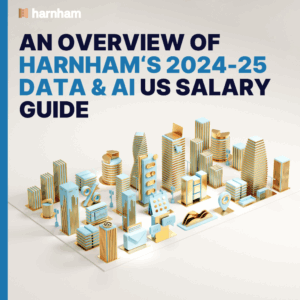 By Luc Simpson-Kent, Managing Consultant – Harnham US
By Luc Simpson-Kent, Managing Consultant – Harnham US
Candidates want growth. Employers want retention.
And in today’s market, both goals rely on the same thing: continuous learning.
The pace of change in data and AI means even the most experienced professionals are going back to school, literally and figuratively.
Across the US, data scientists, engineers and analysts are reskilling faster than ever, not just to keep up with new technologies, but to stay relevant in an industry where roles evolve as quickly as the models they build.
The rise of the always-learning data professional
In Harnham’s latest US Data & AI Salary Guide, a lack of career progression ranked among the top three reasons professionals consider leaving their roles. It’s a clear signal: growth is non-negotiable.
At the same time, 67 % of respondents said they view AI positively, and nearly two-thirds already use it in their daily work. That shift isn’t just changing what people do, it’s redefining how they learn.
Many professionals are now stacking certifications across cloud architecture, data engineering, and AI/ML tools to strengthen career mobility.
Common routes include:
- Databricks, AWS and Azure certifications for cloud data infrastructure.
- Coursera and LinkedIn Learning bootcamps for applied machine learning and Python.
- Specialist courses in GenAI, data governance and AI ethics

Download the Data & AI Salary Guide here.
Learning isn’t just about tools, it’s about trust
AI has pushed many companies to rethink how they train and manage their people.
Accenture research found that nearly half of all working hours in the US are now in scope for automation or AI support. In that context, professionals who can demonstrate adaptability, not just technical ability, are becoming indispensable.
It’s why communication, stakeholder management, and data storytelling are increasingly appearing alongside hard skills in job specs. Upskilling now means learning to translate insights into decisions, not just code into outputs.
AI is reshaping learning itself
What’s interesting is how AI isn’t just the subject of learning; it’s also the teacher.
Modern platforms use AI to map existing skills, spot adjacent strengths, and recommend courses that fill real gaps.
That’s turning training into something personalised and proactive, not reactive.
Instead of waiting for a promotion or performance review, data professionals can see exactly where their next opportunity lies and move toward it before the business even asks.
“Skills-based organizations are 107% more likely to place talent effectively, 52% more likely to innovate, and 57% more likely to anticipate change and respond effectively and efficiently.” (Source: Deloitte)
For employers, this precision matters. Skills-based learning data helps them redeploy talent, plan for automation, and retain people who want to grow without leaving.
It’s no coincidence that companies investing in development see stronger loyalty.
How employers can build a learning-led culture
When learning is relevant, practical, and supported, it becomes part of how teams operate
Start with business goals.
Connect learning to real projects and outcomes so employees see how new skills drive value day to day.
Adopt a skills-first mindset.
Focus on what people can do, not just their job title. Map learning around tasks, capabilities, and future needs.
Make learning hands-on.
Combine expert-led sessions with real projects so people learn by doing.
Personalise the path.
Use AI tools and internal data to tailor learning to each person’s strengths, gaps, and career goals.
Reward and recognise growth.
Celebrate progress through certifications, applied learning, and visible impact on team performance.
Support continuous learning.
Offer post-training resources and peer sessions to keep knowledge fresh and encourage collaboration.
Moving Forward
The best data professionals are already building the skills the market hasn’t even asked for yet.
And the employers that retain them are making sure those skills are built inside their own teams.
Connect with Luc Simpson-Kent for insights on how US businesses can attract, develop, and retain world-class data and AI talent.
Contact Harnham to explore talent development and workforce strategy solutions.

























